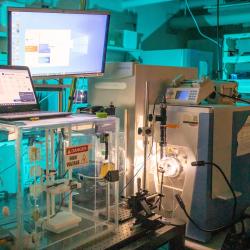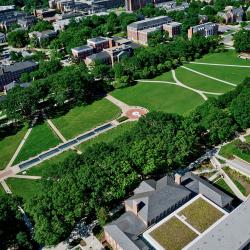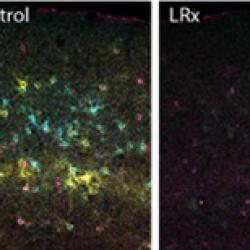Meet UMD Neuroscience Graduate Student Deepali Clare Sengupta
This is the second profile in our new series, where we'll introduce you to Terp student scientists from the University of Maryland's College of Computer, Mathematical, and Natural Sciences.
Meet Deepali Clare Sengupta, a third year Ph.D. student in the neuroscience and cognitive science (NACS) program. Originally from Ellicott City, Md., she received her bachelor's degree in neuroscience from Johns Hopkins University and a Master of Health Sciences in molecular microbiology and immunology from the Johns Hopkins School of Public Health.
What experiences led you to pursue a Ph.D.?
Science has always been on my mind, even when I was a child. Whenever we were in a mall and I saw a Discovery Channel Store, I would drag my parents inside and try to talk them into buying me things like fossil-finding kits and human anatomy models. When I did end up getting a microscope set and a bug collecting kit in elementary school, I was hooked. Both of my parents have Ph.D.s in science, so they have always encouraged my interest in and love of biology. They supported me through undergrad when I discovered neuroscience and helped me find labs where I could gain research experience. In that way, they were my first scientific mentors. After years of laboratory experience and classroom exposure, I decided to pursue a Ph.D. I believe that with this path, I can best apply my interest in science, utilize my creative problem solving skills and help people through biomedical research.
Why did you choose UMD's neuroscience and cognitive science program (NACS)?
Growing up in Maryland, I always knew that the University of Maryland, College Park, had a great academic and research reputation. This became even more apparent when I was applying for Ph.D. programs. During that time, I had an intramural research fellowship at the National Heart, Lung, and Blood Institute at the National Institutes of Health (NIH) in Bethesda, Md. It was hard to ignore how many NIH investigators also had appointments at UMD, which made obvious the possibilities for collaboration and shared resources. NACS was among the most diverse programs that I considered. The research focuses of the affiliated professors represented the entire spectrum of the behavioral, social, computational and biological sciences. I really value my diverse research background, so choosing a program that would give me an opportunity to utilize those skills and provide me with a well-rounded education was a priority. Most importantly, I found a faculty member whose lab I very much wanted to join, Dr. Elizabeth Quinlan (associate professor of biology). Her group’s work with adult neuroplasticity in the visual system greatly interested me. Her lab has shown that total recovery from chronic monocular blindness (Amblyopia), which was formerly thought to be irreversible past adolescence, is possible in rodents well into adulthood. This work interested me not only in a technical sense, related to skills I wanted to acquire, but also in terms of the broader public health impacts of the research.
What are your research interests?
I am very interested in how changes at a molecular/cellular level affect behavioral outcomes. This is rooted in my bachelor's and master’s degree background, as well as all of the hands-on experience that I have gained over the last 10 years working in numerous labs. It is fascinating to me that changes on a very small level, such as the difference in activation of a single protein or slight fluctuation in hormones, can alter sensory experience so wildly. My current project incorporates this interest in a couple of ways. First, I am developing a marker for activated connections between neurons (synapses) to explore differences in cellular function across vision-deprived and vision-recovered brain areas. With the use of a fluorescent tag attached to this marker, I can use this tool to reveal which specific connections in the visual system regain their function in recovery from Amblyopia. Additionally, I am starting to explore if short-term, low-dose hormone treatment can increase brain plasticity in the visual cortex and help speed up the recovery from Amblyopia.
How is your research relevant and important in a broader context?
Presently, there are many reliable markers for activity at the cell body or nucleus of a neuron, but localizing activity to specific synapses has proved very difficult. Developing this kind of marker will be a great step forward for many areas of neurobiology that are looking to discover which connections are involved in what functional circuitry. The hormone treatment paradigm I have proposed has the potential to be easily translated to humans to rescue plasticity in human sensory areas (such as the visual system). Importantly, because there is an increasingly large aged population in this country, short-term hormone administration can also be used to address the growing public health issue of cognitive deficits that occur normally in the aging brain.
What advice would you give to an undergraduate looking to pursue a Ph.D. in neuroscience?
Even though it doesn’t feel like it when you’re getting your bachelor's degree, you’ll never have as much time, freedom and opportunity to do exactly what you want as when you are in college. So, get exposed to as much hands-on research as you can when you’re getting your undergraduate degree. At a large research university like Maryland, there are so many opportunities to join a lab that is eager to train and mentor interested, intelligent undergraduates. With experience under your belt, you’ll have a good sense of what interests you and what kind of lab environment suits you. Also, building relationships with faculty through undergraduate research will be invaluable when you go through the process of finding and selecting a graduate institution. A research mentor who is familiar with your work ethic and interests will be able to provide excellent advice and help during your search.
How important is faculty mentoring in your Ph.D. program and how has it affected your graduate experience?
Faculty mentoring is a very important part of any Ph.D. program. I have been very fortunate to not only have a very involved advisor (Dr. Quinlan), but also an advisory committee that is composed of two additional members (Dr. Catherine Carr and Dr. Erica Glasper) who are talented and accomplished faculty members. My committee successfully guided me through my qualifying exams last semester and onward toward formulating my thesis proposal, which is an integral step toward completing my degree. I am privileged to call this group of women my mentors and will continue to seek their advice as I progress through my graduate work.
Have you had the opportunity to teach and mentor undergraduate students?
Yes, and it has been very rewarding. In addition to research, another essential aspect of a career in academia is being an educator. At Maryland, I have helped teach several undergraduate classes, and also closely mentored a student. Min Lee (a senior biology major) joined the Quinlan lab in the summer of 2013 and since then, I have trained her in using various biological research techniques and shared my knowledge of neuroscience with her. The mentoring experience, as well as classroom teaching, has been central in helping me grow as an instructor, supervisor and colleague.
What has been, in your opinion, your biggest challenge and success at Maryland?
My biggest challenge to date has been my qualifying exams. In the NACS program, Ph.D. students are tested in both written and oral formats on mastery of information from their courses, as well as their understanding of their research topic. The exam is formulated by their advisory committee and tailored specifically to the student. When I passed those exams, I was not only relieved, but I felt truly confident in my breadth and depth of knowledge. My biggest success came recently when the ARCS Foundation chose me to receive a fellowship for the 2015-2016 academic year. I was named one of six scholars selected from the University of Maryland. I am very honored by the recognition and the chance to represent the university.
What do you want to do when you finish your degree?
I would love to be the principal investigator of my own laboratory group so I can keep pursing neuroscience research and mentoring students toward careers in science.
Media Relations Contact: Abby Robinson, 301-405-5845, abbyr@umd.edu
Writer: Nikita Mehta
University of Maryland
College of Computer, Mathematical, and Natural Sciences
2300 Symons Hall
College Park, MD 20742
www.cmns.umd.edu
@UMDscience
About the College of Computer, Mathematical, and Natural Sciences
The College of Computer, Mathematical, and Natural Sciences at the University of Maryland educates more than 7,000 future scientific leaders in its undergraduate and graduate programs each year. The college's 10 departments and more than a dozen interdisciplinary research centers foster scientific discovery with annual sponsored research funding exceeding $150 million.







